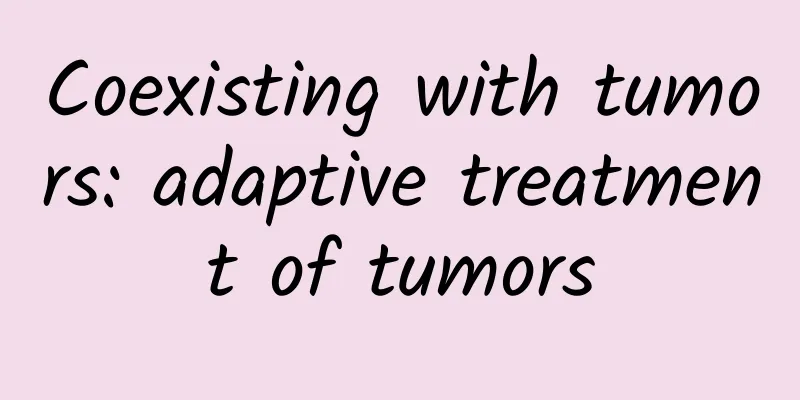Coexisting with tumors: adaptive treatment of tumors

|
Author: Chu Juhang Shanghai Tenth People's Hospital Qian Mingping Shanghai Tenth People's Hospital Reviewer: Li Jun, Chief Physician, Shanghai Tenth People's Hospital In recent years, with the development of medical technology, the early diagnosis rate of cancer has been significantly improved, the treatment effect has been significantly improved, and the prognosis of patients has been significantly improved. Although we cannot completely conquer cancer, "cancer = death" has gradually become a thing of the past. Cancer is classified as a chronic disease. We need to establish a mindset of treating chronic diseases and find ways to slow down the progression of cancer so that it can be controlled like diabetes and hypertension. This is adaptive treatment of tumors. Today we will learn about adaptive treatment of tumors and understand how to "coexist with tumors." Tumor tolerance makes it a little difficult to eliminate tumors At present, the main methods for treating cancer include surgery, radiotherapy, chemotherapy, targeted therapy and immunotherapy, etc. These treatments follow the maximum tolerated dose model, in other words, the maximum dose is used within the maximum range allowed by the patient's physical condition to achieve the maximum killing of the tumor. With the development of single-cell sequencing technology, people have realized that each cancer cell may be different, just as there are no two leaves in the world that are exactly the same, so the sensitivity to therapeutic drugs will also vary from cell to cell. Tumor cells are very cunning and know how to survive the carpet bombardment of therapeutic drugs. As the number of treatments increases, tumor cells will become more and more "difficult to kill", which is professionally called tumor resistance. The mechanisms of tumor drug resistance mainly include: on the one hand, large doses of drugs break the original balance between sensitive tumor cells and drug-resistant cell subpopulations, resulting in a decrease in the number of sensitive cells as the treatment progresses, and drug-resistant cells take this opportunity to increase wildly and take the initiative; on the other hand, under the selective pressure of drugs, some cells that were originally sensitive to drugs become drug-resistant cells. This is why many advanced cancer treatments can effectively kill tumor cells at the beginning of treatment, but will soon develop into irreversible drug resistance, accompanied by a rapid deterioration of the patient's condition. Faced with this dilemma, most clinicians would choose to replace the drug that has been tolerated with other drugs. However, tumor cells will soon repeat the above process and become resistant to the new drug. This cycle repeats itself, and it becomes difficult to eliminate all tumor remnants. Adaptive therapy to achieve coexistence with tumors Adaptive therapy refers to adjusting drugs according to the competitive relationship between drug-sensitive cells and drug-resistant cells and the development of tumors, retaining some sensitive cells to maintain their competitive advantage. At this time, the optimal therapeutic dose is no longer the maximum therapeutic dose, but the necessary minimum dose. Once the tumor shrinks to the ideal size, treatment is stopped or maintained to ensure the advantage of sensitive cells. Some friends may wonder if leaving the tumor behind will lead to tumor progression? It is normal to have such doubts, so when using adaptive therapy, it is necessary to closely monitor the tumor, such as regularly testing tumor markers and imaging examinations, and once the tumor is found to have a tendency to progress, timely drug treatment should be given. Figure 1 Copyright image, no permission to reprint Retreat to advance, and reap unexpected surprises For some slowly progressing, less malignant tumors, such as prostate cancer, certain types of thyroid cancer, or lymphoma, doctors may choose an adaptive treatment strategy. It should be emphasized that coexistence with tumors does not mean giving up treatment, but rather shifting the goal of treatment from cure to control, and from prolonging life to improving the quality of life. Doctors will develop individualized treatment plans based on the patient's specific circumstances to maximize the patient's survival time and help them stay as comfortable and dignified as possible. The ultimate goal is to allow patients to resume daily activities and enjoy life as much as possible while coexisting with the tumor, rather than focusing solely on the size and number of the tumor. Self-management of living with tumor 1. Dietary adjustment: Eat a balanced diet and increase the intake of foods rich in vitamins, minerals and antioxidants, such as fresh fruits and vegetables, whole grains, lean meat and soy products. 2. Moderate exercise: Engage in appropriate physical activities according to the doctor's advice, such as walking, yoga, Tai Chi, etc., which will help improve physical fitness and enhance immunity. 3. Regular review: Regular review to monitor changes in the condition so as to adjust the treatment plan in time. 4. Follow doctor's orders: Patients should strictly follow the doctor's prescriptions and treatment instructions, take medications on time, and should not increase or decrease the dosage or stop taking medications at will. Figure 2 Copyright image, no permission to reprint For cancer patients, whether to choose traditional treatment or adaptive treatment, clinicians and patients must weigh the pros and cons and make a proper choice. No matter which treatment method is used, it should emphasize the self-management of cancer patients, maintain a positive attitude towards treatment, and face cancer optimistically! |
<<: Ultraviolet Survival for Hair and Scalp
>>: Tear off prejudice and correctly understand cerebral palsy from the movie "Little Me"
Recommend
Stay away from "heart trouble": How can the elderly prevent cardiovascular disease? This article tells you
As people age, their organs will gradually weaken...
If the armpits of a pregnant woman turn dark, is it a boy?
Good skin requires maintenance. Many women pay mo...
How long does the temperature rise last after ovulation?
Women all know that during the normal ovulation p...
Can hand sanitizer replace hand washing? 6 hand washing misunderstandings, how many of them have you encountered?
Hands are the part of the body that most often to...
What are the benefits of yoga for girls?
Nowadays, most people pay more attention to healt...
What is the matter with my aunt's black period?
Women will experience bleeding during their menst...
[Medical Q&A] Does a test report showing abnormal myocardial enzyme spectrum mean myocardial infarction?
Planner: Chinese Medical Association Reviewer: Ni...
To prevent myocardial infarction, in addition to taking medicine to control the "three highs", you should also avoid these inducing factors
A man in his 60s was sent to the hospital by his ...
What should I do if my milk suddenly runs out after four months of breastfeeding?
After giving birth, the breasts of pregnant women...
Is the pregnancy test accurate after 13 days of intercourse?
Pregnancy is a very strange thing. If a woman has...
Can pregnant women eat Laiyang pears?
Pregnant women are the group that needs the most ...
Know the details of menopause and deal with it calmly - menopausal health care is urgent
This is the 3556th article of Da Yi Xiao Hu "...
What is multiple cervical cysts?
Many people may not know about the disease called...
How to conceive with a retroverted uterus? What are some good methods?
We all know that conception is the result of the ...
Can I give birth naturally if my fetus is in an abnormal position?
Generally speaking, malposition of the fetus will...









